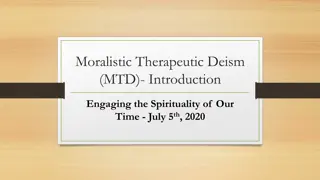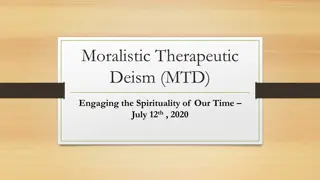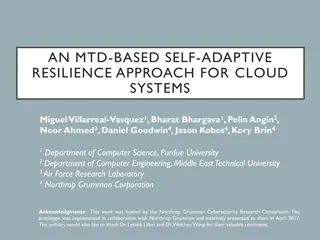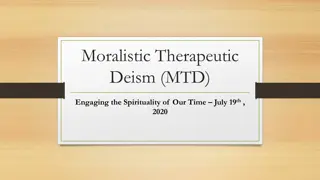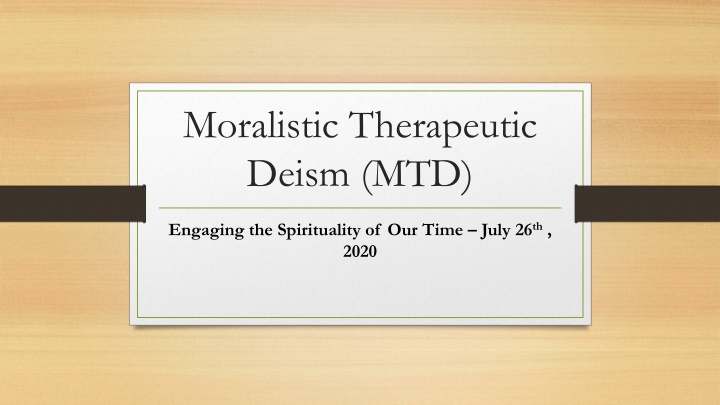
Moralistic Therapeutic Deism: Engaging Spirituality Today
Explore the belief system of Moralistic Therapeutic Deism (MTD) and its significance in today's society. Delve into its core beliefs, counter it with Biblical Christianity, and understand how it impacts spiritual lives.
Download Presentation

Please find below an Image/Link to download the presentation.
The content on the website is provided AS IS for your information and personal use only. It may not be sold, licensed, or shared on other websites without obtaining consent from the author. If you encounter any issues during the download, it is possible that the publisher has removed the file from their server.
You are allowed to download the files provided on this website for personal or commercial use, subject to the condition that they are used lawfully. All files are the property of their respective owners.
The content on the website is provided AS IS for your information and personal use only. It may not be sold, licensed, or shared on other websites without obtaining consent from the author.
E N D
Presentation Transcript
Moralistic Therapeutic Deism (MTD) Engaging the Spirituality of Our Time July 26th, 2020
Moralistic Therapeutic Deism (MTD) Class Outline July 5th: Introduction July 12th: Deism/Theism July 19th: Moralistic July 26th: Therapeutic
MTD: Core Beliefs (gotquestions.org) 1. A god exists who created and ordered the world and watches over human life on earth. (DEISM) 2. God wants people to be good, nice, and fair to each other, as taught in the Bible and by most world religions. (MORALISTIC) 3. The central goal of life is to be happy and to feel good about oneself. (THERAPEUTIC) 4. God does not need to be particularly involved in one s life except when God is needed to resolve a problem. (DEISM & THERAPEUTIC) 5. Good people go to heaven when they die. (MORALISTIC)
MTD: Significance - 1 This belief system has become much more ubiquitous in the entire population and most significantly in the church. The goal of this class is to try to understand and analyze the belief system; try to explore what makes it so popular and to see how it lines up with Biblical Christianity and the Gospel of Jesus Christ.
MTD: Significance - 2 We need to understand what our friends, family and neighbors believe as well as for each of us to have a better understanding of Biblical truth. This is also very applicable to our lives beyond just head knowledge since the core beliefs of MTD have tremendous implications on our own spiritual lives and on how we do life. MTD easily creeps into our own thinking and hearts much more frequently than we would all like to admit.
MTD- Review Countering MTD and understanding the Gospel will only make sense if we have an accurate image of God as he is revealed in scripture The importance of the authority of scripture versus an alternative or competing authority such as individualism, culture or both The deism/theism is the foundational problem that logically leads to the moralistic and therapeutic components of MTD A rejection of our sinful nature in the context of a theistic or deistic understanding of God logically leads to a moralistic (legalistic) and therapeutic religion.
MTD: Therapeutic Gospel What is wrong with wanting to be happy? Depression Regular mood What is wrong with wanting to feel good about oneself? Self-esteem? Accurate view versus distorted identity What is wrong with calling out to God to solve our problems? Prayer? Philippians 4:6 Do not be anxious about anything, but in everything by prayer and supplication with thanksgiving let your requests be made known to God.
Mental Health Crisis The National Survey on Drug use and Health administered by the U.S. Department of Health and Human Services (surveyed over 600,000 Americans): From 2009 to 2017, major depression among 20- to 21-year-olds more than doubled, rising from 7 percent to 15 percent. Depression surged 69 percent among 16- to 17-year-olds. Twice as many 22- to 23-year-olds attempted suicide in 2017 compared with 2008, and 55 percent more had suicidal thoughts. The increases were more pronounced among girls and young women. Serious psychological distress, which includes feelings of anxiety and hopelessness, jumped 71 percent among 18- to 25-year-olds from 2008 to 2017 By 2017, one out of five 12- to 17-year-old girls had experienced major depression in the previous year. The suicide rate among 18- to 19-year-olds climbed 56 percent from 2008 to 2017.
The Gospel and the Mental Health Crisis The crisis is legitimate Multifactorial reasons There is always a spiritual component to everything we experience - especially emotional and mental health even when there is a biological component to the distress Mental health struggles expose a unique vulnerability to spiritual attacks since there is a frequent distortion of truth of who we are and who God is (basis of MTD). Romans 8: 35 Who shall separate us from the love of Christ? Shall tribulation, or distress, or persecution, or famine, or nakedness, or danger, or sword? (Truth) Nothing can separate us but when we are struggling, we tend to see things through a distorted lens versus a Biblical True Gospel Lens (BTGL) Jesus cares about our distress (BTGL) - We don t believe in a theistic God who is far off and is not involved in our lives (MTD) 2 Corinthians 1:3-4 Blessed be the God and Father of our Lord Jesus Christ, the Father of mercies and God of all comfort, who comforts us in all our affliction, so that we may be able to comfort those who are in any affliction, with the comfort with which we ourselves are comforted by God.
MTD: Therapeutic Gospel In this new gospel, the great evils to be redressed do not call for any fundamental change of direction in the human heart. Instead, the problem lies in my sense of rejection from others; in my corrosive experience of life s vanity; in my nervous sense of self-condemnation and diffidence; in the imminent threat of boredom if my music is turned off; in my fussy complaints when a long, hard road lies ahead. These are today s significant felt needs that the gospel is bent to serve. Jesus and the church exist to make you feel loved, significant, validated, entertained, and charged up. This gospel ameliorates distressing symptoms. It makes you feel better. The logic of this therapeutic gospel is a Jesus-for-Me who meets individual desires and assuages psychic aches. David Powlison https://www.9marks.org/article/therapeutic-gospel/
MTD: Matthew 11:28-30 28 Come to me, all you who are weary and burdened, and I will give you rest.29Take my yoke upon you and learn from me, for I am gentle and humble in heart, and you will find rest for your souls.30For my yoke is easy and my burden is light
MTD: Matthew 6: 28-34 28 And why do you worry about clothes? See how the flowers of the field grow. They do not labor or spin.29Yet I tell you that not even Solomon in all his splendor was dressed like one of these.30If that is how God clothes the grass of the field, which is here today and tomorrow is thrown into the fire, will he not much more clothe you you of little faith?31So do not worry, saying, What shall we eat? or What shall we drink? or What shall we wear? 32For the pagans run after all these things, and your heavenly Father knows that you need them.33But seek first his kingdom and his righteousness, and all these things will be given to you as well.34Therefore do not worry about tomorrow, for tomorrow will worry about itself. Each day has enough trouble of its own.
Quote Jesus is a teacher who doesn t just inform our intellect but forms our very loves. He isn t content to simply deposit new ideas into your mind; he is after nothing less than your wants, your loves, your longings. James K.A. Smith, You Are What You Love: The Spiritual Power of Habit Our wants, loves and longings being formed by Christ versus This gospel ameliorates distressing symptoms. It makes you feel better. Distressing symptoms really are distressing! Based on the scripture passages we read, how do we respond to those distressing symptoms that are very real and frequently painful?
Quote- I cant do life right no my own Here is the sweet paradox in how God works. He blesses those who admit that they need help: The poor in spirit are blessed (Matthew 5: 3). Sanity has a deep awareness, I need help. I can t do life right on my own. Someone outside me must intervene. The sanity of honest humility finds mercy, life, peace, and strength. By contrast, saying we don t need help keeps us stuck on that hamster wheel of making excuses and blaming others. The end result isn t life and peace; it s self- righteousness, self-justification, alienation, and bitterness. David A. Powlison, Good and Angry: Redeeming Anger, Irritation, Complaining, and Bitterness




